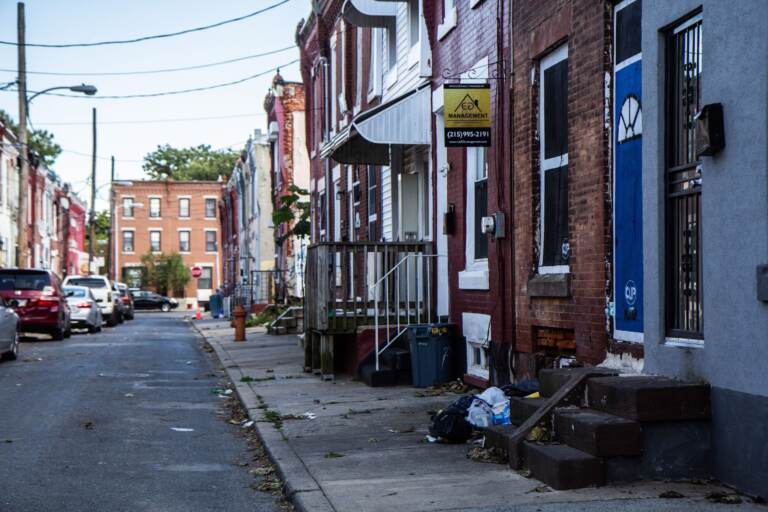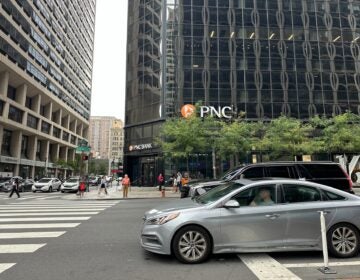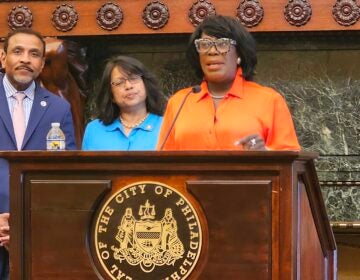New analysis finds evidence of racial bias in Philly property assessments
The report found that property assessments in Black and Hispanic neighborhoods were more likely to be inaccurate.
Listen 1:24
Rowhouses in Philadelphia. (Kimberly Paynter/WHYY)
Have a question about Philly’s neighborhoods or the systems that shape them? PlanPhilly reporters want to hear from you! Ask us a question or send us a story idea you think we should cover.
Sandra Carter nearly fainted the day she saw the most recent property assessment for the triplex she and her siblings own in West Philadelphia.
According to the notice she got from the city, the value of her family’s Parkside apartment building had jumped to $513,800 in 2022 — a nearly 500% increase from the previous citywide reassessment in 2019, when the three-story property was valued at $90,200.
“I said, ‘What could have made this property explode like that to that amount?’” said Carter, 61. “It’s the same property we’ve always lived in. We have done little to no improvement.”
The new value put Carter and her sister at risk of becoming homeless.
Property assessments are used to calculate property taxes. Based on the city’s new figure, she owed $6,072 — an exponentially bigger bill she had no way of paying. In recent years, Carter’s federal pension, valued at roughly $23,000 a year, has effectively been the only thing keeping the property in family hands.
“Really the whole burden of the household has been mine,” she said.
Carter immediately appealed the assessment and later reached an agreement with the city that’s expected to put the property’s value at about $150,000. But researchers say the episode illustrates systemic biases baked into Philadelphia’s property assessments — biases Mayor Cherelle Parker’s administration is vowing to address with a new task force.
The announcement comes two days before a budget hearing for the Office of Property Assessment, which is expected to release a new set of property assessments in late May. There was no citywide reassessment last year in order to give OPA time to work through the thousands of informal appeals it received in response to the property values it released in 2022, the first reassessment in three years as a result of pandemic-related issues. The average value of residential properties shot up 31% in 2022, generating widespread outrage and about 20,000 “First Level Reviews.”
The work of the Philadelphia Residential Property Assessment Task Force will be rooted in the release of a new report that shows homes in predominantly Black, Hispanic and low-income neighborhoods in the city were more likely to be inaccurately assessed in 2022 compared to homes in majority white and higher-income neighborhoods.
In Philadelphia, property assessments are supposed to equal — or at least closely mirror — the current market value of that property. And most of them do, the report found. In these “hotspots,” however, the report found that homeowners in lower-priced homes were more likely to be over-assessed while homeowners in higher-priced homes were likely to be under-assessed.
“There’s an increased chance that they’re paying more than their fair share,” said Montgomery Wilson, a senior attorney at Community Legal Services, which partnered with the Reinvestment Fund and the Center for Economic Policy Analysis on the report.
The problem, experienced by municipalities across the country, was particularly true for residents in North and West Philadelphia, including Parkside, a historically Black neighborhood that’s beginning to gentrify.
There was no evidence the city intentionally discriminated against anyone, said Wilson.
The report makes a series of recommendations aimed at addressing bias, including the creation of a stakeholder group to develop an action plan to address systemic bias in assessments.
The task force will include representatives from the Reinvestment Fund, CLS, OPA and industry experts, according to a news release. The group will be focused on “identifying best practices and creating frameworks for implementation.”
Ira Goldstein, senior policy advisor for the policy solutions groups at the Reinvestment Fund, will chair the group. Part of his job will be to help the city ensure it is working towards having “more accurate, uniform, and equal assessments for residents across Philadelphia’s neighborhoods,” according to Friday’s announcement. The report recommends the city commission an annual study to test for systemic bias in residential assessments.
“Consistently and regularly look back to make sure you’re not finding errors or quality challenges attached to those specific kinds of neighborhoods. And if they are, dig in and try and figure out why,” said Goldstein.

Get daily updates from WHYY News!
WHYY is your source for fact-based, in-depth journalism and information. As a nonprofit organization, we rely on financial support from readers like you. Please give today.








